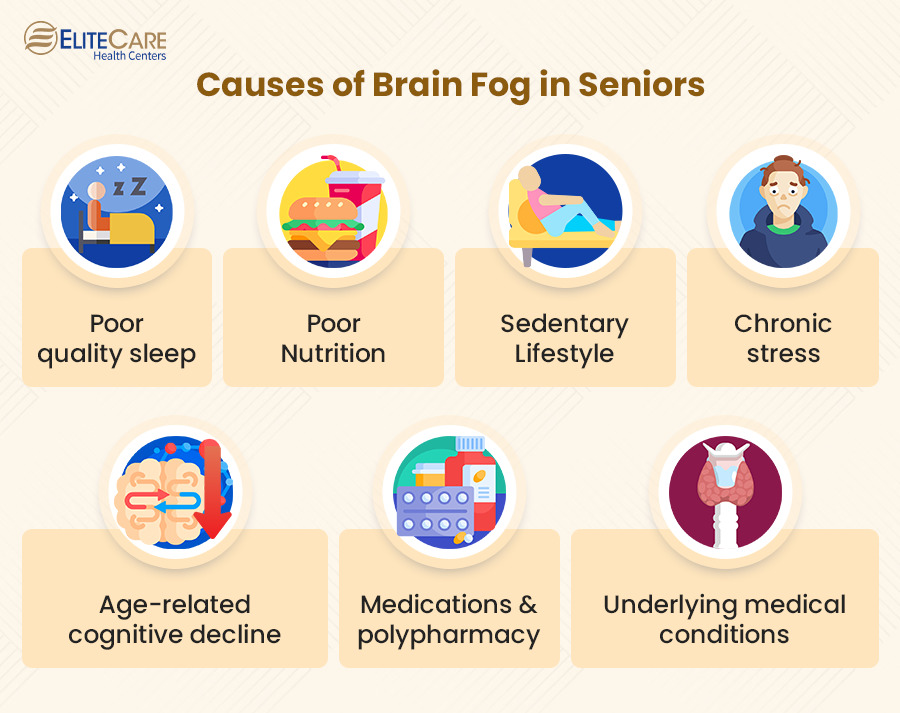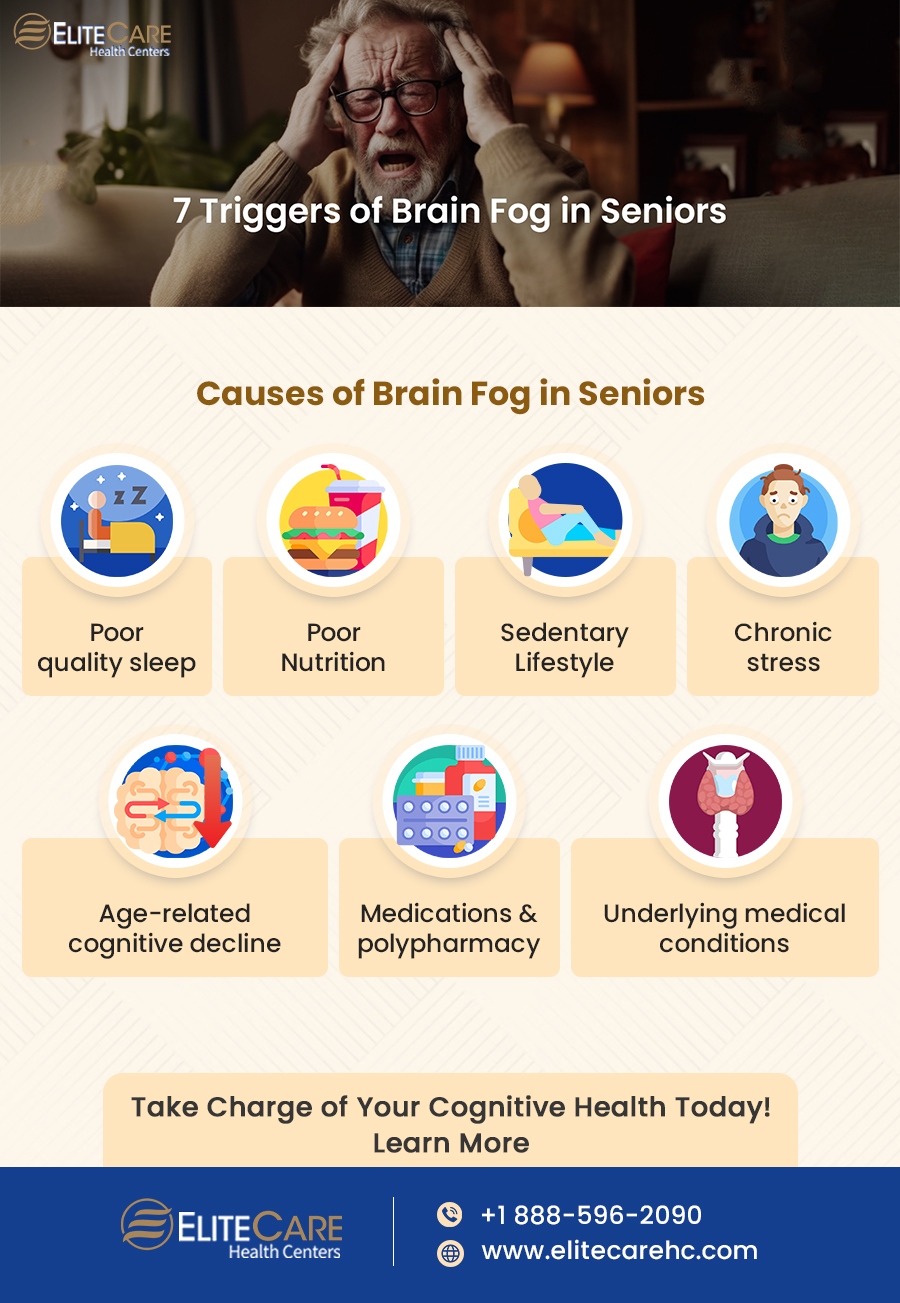
Brain fog can be an unsettling and frustrating experience, particularly for seniors. It casts a veil over cognitive clarity, affecting memory, focus, and mental sharpness, impacting various aspects of seniors’ daily lives.
Addressing brain fog is crucial for the overall well-being of seniors as it directly affects their quality of life and independence. It can hinder their ability to socialize, engage in hobbies, and even carry out basic self-care activities. Moreover, persistent brain fog may increase frustration, anxiety, and a sense of helplessness.
In this blog, we will explore seven potential triggers that contribute to brain fog. Understanding these factors is vital to help seniors, their caregivers, and senior care service professionals take proactive measures to mitigate brain fog and promote cognitive health in the aging population.
What Causes Brain Fog
Brain fog can have various causes, and it is essential to identify and address these factors to alleviate cognitive cloudiness and promote mental clarity.

1. Age-related Cognitive Decline
As individuals age, it is natural for certain cognitive changes to occur. While some seniors may experience minimal impact on their cognitive abilities, others might notice more significant changes.
Seniors usually experience natural cognitive changes that can affect their daily life. They might find that their processing speed is slower, and they need to help multitask or remember certain things.
Common challenges for seniors include forgetfulness, confusion, word retrieval problems, and decreased attention span. However, there are strategies to support cognitive health and delay brain fog, such as:
- Engaging in mentally stimulating activities like puzzles, reading, or learning a new skill can help keep the brain active and sharp.
- Regular physical activity has been linked to improved cognitive function and can help enhance blood flow to the brain.
- Maintaining an active social life and staying connected with friends and family can provide mental stimulation and emotional support.
- Chronic stress can contribute to brain fog, so implementing stress-reduction techniques like meditation or yoga is essential.
- Routine medical check-ups can help identify and address any underlying health issues contributing to cognitive decline.
2. Sleep Deprivation and Sleep Disorders
Quality sleep is essential for optimal brain function. However, common sleep issues can disrupt seniors’ restorative rest, leading to cognitive challenges and brain fog. Medical clinics and senior care services must address sleep-related concerns to improve overall cognitive well-being.
During sleep, the brain undergoes vital processes, such as memory consolidation and neural repair, essential for cognitive function. Adequate rest allows seniors’ brains to function optimally, improving memory, attention, and decision-making abilities.
Seniors often face various sleep-related challenges. Insomnia can cause difficulty falling or staying asleep, while sleep apnea leads to interruptions in breathing during sleep, affecting sleep quality. Restless leg syndrome and periodic limb movement disorder can cause involuntary leg movements, disrupting sleep patterns.
Some ways to improve sleep hygiene and address sleep disorders are as follows:
- Go to bed and wake up simultaneously daily to help regulate the body’s internal clock.
- Engage in calming activities before bed, such as reading, gentle stretching, or warm baths.
- Keep the bedroom dark, quiet, and at a comfortable temperature to promote better sleep.
- Reduce or avoid caffeine and alcohol, especially close to bedtime, as they can disrupt sleep.
- While short daytime naps can be refreshing, long or late-afternoon naps may interfere with nighttime sleep.
- If suspected, consult a healthcare professional to diagnose and treat sleep disorders like sleep apnea or RLS.
- Reduce exposure to screens (phones, tablets, computers) before bedtime, as blue light can disrupt sleep patterns.
3. Medications and Polypharmacy
Certain medications can cause cognitive side effects, leading to brain fog and impacting seniors’ cognitive abilities. The use of multiple medications concurrently, known as polypharmacy, can further worsen cognitive issues and affect brain health.
To address these concerns, medication review and consultation with healthcare professionals, including primary care physicians and online doctor consultations, are crucial components of senior care services provided by healthcare clinics. By identifying and managing medications that may contribute to cognitive impairment, healthcare professionals can help seniors optimize their medication regimens and improve their overall cognitive well-being.
The goals of a medication review are as follows:
- To explore alternative treatment options and identify medications known to cause cognitive impairment.
- Reviewing medications can simplify the drug regimen, reduce the number of medications, and minimize the risk of adverse effects.
- Regular medication review allows healthcare professionals to monitor changes in cognitive function and adjust medications accordingly.
- Seniors and their caregivers should receive clear information about each medication’s purpose, potential side effects, and how to manage them.
4. Poor Nutrition and Dehydration
The link between nutrient intake and cognitive health is undeniable. Common nutritional deficiencies in seniors, such as vitamin B12, omega-3 fatty acids, and antioxidants, can significantly impact cognitive abilities.
Healthcare clinics offering services like annual and routine physical exams play a crucial role in assessing seniors’ nutritional status. Additionally, doctors can provide personalized dietary recommendations and guidance to address nutritional deficiencies, promoting better cognitive health and overall well-being in seniors.
To improve nutrient health, seniors should consume:
- A wide range of fruits, vegetables, whole grains, lean proteins, and healthy fats ensures a diverse intake of essential nutrients.
- Fatty fish like salmon, mackerel, or sardines regularly obtain omega-3 fatty acids or consider a supplement if necessary.
- Blueberries, walnuts, turmeric, and leafy greens are among the foods known for their potential cognitive benefits.
- Fortified foods or take supplements to ensure sufficient vitamin B12 levels.
- Consider having vitamin D supplements if sun exposure is limited.
- Drink plenty of water throughout the day to maintain hydration; even mild dehydration can affect cognitive performance.
5. Sedentary Lifestyle and Lack of Exercise
Staying physically active positively impacts cognitive function, memory, and mental clarity. However, seniors may face barriers to exercise, which can hinder their ability to lead an active lifestyle. These barriers include physical limitations, fear of injury, lack of motivation, and limited access to suitable exercise facilities.
To overcome these obstacles, healthcare clinics can provide valuable support and guidance. By addressing barriers and promoting an active lifestyle, healthcare professionals can empower seniors to improve their cognitive health and overall well-being, leading to a more vibrant and fulfilling life.
Some exercises that are beneficial for seniors are as follows:
- Aerobic Exercises: Walking, cycling, and swimming are excellent low-impact aerobic exercises that improve cardiovascular health and boost brain function.
- Strength Training: Resistance exercises using light weights or bands can help build muscle strength and improve overall mobility.
- Yoga and Tai Chi: These activities promote balance, flexibility, and relaxation, improving cognitive function.
- Brain-Boosting Activities: Mentally stimulating activities like puzzles, crosswords, or memory games can complement physical exercise and enhance cognitive abilities.
- Balance and Coordination Exercises: Balance exercises, such as standing on one leg or heel-to-toe walking, can help improve balance and prevent falls.
6. Chronic Stress and Mental Health
Prolonged exposure to stress hormones like cortisol can lead to memory problems, reduced attention, and impaired decision-making. Additionally, common mental health issues affecting seniors, such as depression, anxiety, loneliness, and grief, can worsen the effects of chronic stress on cognitive function.
Depression may lead to sadness, lack of interest, and difficulties in concentration, while anxiety can result in excessive worry and restlessness, affecting cognitive performance. Seniors experiencing loneliness and isolation may also suffer from cognitive challenges. Coping with grief and loss can trigger sadness, further impacting cognitive abilities.
Ways to address chronic stress are as follows:
- Practicing mindfulness and meditation to reduce stress, improve focus, and promote emotional well-being.
- Deep breathing exercises can trigger the body’s relaxation response, reducing stress and anxiety.
- Regular exercise benefits physical health and is a natural stress reliever, promoting better mental well-being.
- Engaging in hobbies, art, or music can be a form of therapy and provide a positive outlet for stress.
- Seeking the help of a mental health professional, such as a counselor or therapist, can provide valuable guidance and support.
- Encouraging seniors to take time for self-care activities, such as reading, gardening, or spending time in nature, can promote mental well-being.
7. Underlying Medical Conditions
Chronic conditions can directly impact cognitive function. Diabetes, for instance, can affect blood sugar levels, leading to fluctuations that impair cognitive abilities. Thyroid disorders can result in imbalances of thyroid hormones, causing cognitive changes and memory issues. Chronic kidney disease, liver dysfunction, and autoimmune disorders can also affect brain health and contribute to brain fog.
Addressing and managing these underlying medical conditions is important. Regular health check-ups and disease management are essential for seniors for the following reasons:
- Regular check-ups allow early detection of health issues, enabling timely intervention and treatment and reducing the risk of complications.
- Disease management through regular check-ups helps prevent potential health problems and promotes overall well-being.
- Regular monitoring ensures seniors maintain optimal health, enhancing their quality of life and cognitive function.
- Managing chronic conditions through regular check-ups helps control symptoms and reduce the impact of illnesses on cognitive health.
- Check-ups help create long-term health plans to manage and prevent age-related health issues.
Take-Away
In this journey toward cognitive health, seniors can take charge of their well-being. With the support of exceptional healthcare facilities like EliteCare Health Center, they can thrive, cherishing each moment with mental acuity, emotional resilience, and a zest for life.






